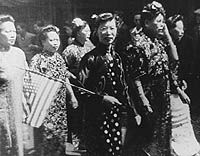
November 22, 1999
New book gives voice to the stories of Chinese American women
By Barbara McKenna
Expected to serve and obey without question, often exploited as factory workers,
indentured servants, or prostitutes, Chinese women who immigrated to America in the
early 20th century were thought to not have any power over their own destiny. However,
a new book by historian Judy Yung, which gives voice to the unheard stories of many
of these women and their daughters, reveals lives lived with fortitude, resilience,
and great strength of character.
 |
| Lai Yee Guey, one of the women featured in Judy Yung's new book, pictured proudly
holding the American flag during a Victory Day parade at the end of the World War
II. Photo: courtesy of Lorena How |
Yung, an associate professor of American studies, tells two stories at once in her new book: the social history of Chinese women in San Francisco from the turn of the century through World War II and the personal tales of 40 Chinese American women. Yung's compelling history unfolds through oral histories, immigration interviews, newspaper articles, letters, poems, autobiographies, speeches, and other sources.
Unbound Voices, a sequel to Yung's 1995 book, Unbound Feet (also published by UC Press), uses the same structure as its award-winning predecessor, beginning with the women who lived in China in the 19th century, progressing on to experiences of Chinese immigrant women in San Francisco in the early 1900s, and those of their second-generation daughters during the Great Depression and World War II.
Yung's book is already being hailed by critics, who consider it an outstanding primary sourcebook for Asian American and women's studies. The book succeeds in presenting an insightful historical and socioeconomic picture of life for Chinese women in the first half of the 20th century that becomes vivid through the personal experiences of the women who lived during that time. "Just as with Unbound Feet, I try to interweave text and context so that this is not just a collection of voices," she explained.
Yung thought that when she completed Unbound Feet, a ten-year project, she was done with the subject and would move on to something else. But, she said, "I couldn't put it to rest. I had all this rich material in the women's own voices crying to be heard. When I realized this might be the last time these stories will see the light of day, I decided to do the second volume."
Yung herself was born in San Francisco to Chinese immigrants, and the accounts of her mother, Jew Law Ying, are a compelling part of the story. Like many women who came to the U.S. from China, Jew Law Ying came with bright expectations that were quickly dashed.
"I cried a lot when I first came to Menlo Park," Jew Law Ying recalled in her oral history. "So this was what Gold Mountain was all about! So this was heaven! No bathtub, no icebox, a wood-burning stove, no hot water. I wanted to go back to China where we had servants to cook and to serve us, where I was happy eating my grandfather's food and wearing my grandfather's clothes. Here I had to do everything myself, including washing the laundry by hand and fetching the firewood. It was a sorrowful three years."
Yung also included a section on Chinese proverbs that illustrate the prevailing attitudes toward women. Among them, "a woman without a husband is like a house without a roof beam"; "a woman without talent is virtuous"; and "one good wife guarantees three generations of good offspring." However, as Yung explained, "Women always found ways to circumvent these limited gender roles."
Women of various ages and occupations are included in Yung's book, from the first wave of immigrants whose main concern was survival to later generations grappling with assimilation and racism. Eva Lowe told Yung of her attempts to find work during the Depression: "I saw an ad that said they wanted to hire a seamstress on Third Street. I remember I went over there and asked for the job. I had that ad from the newspaper and she said, 'We don't hire Orientals.' Not Chinese, but Orientals. I said, 'You have that ad there." She told me, 'Well, I don't mind, but I don't think the workers would be willing to work with you.' Now you cannot say that. You'll be sued, right?"
A firsthand account from a missionary journal depicts another common story. A daughter sold by her parents (in this case for $450 Mexican dollars), Wong Ah So was brought to America as a wife and then sold into prostitution. She was eventually rescued by Donaldina Cameron of the Presbyterian Mission Home in San Francisco and agreed to marry a Chinese merchant in Boise, Idaho. As interesting as her own story is, so is the perspective Yung added on how Wong Ah So's attitude changed over time, from complete acceptance and obedience to her parents and owners to a willingness later on to challenge her husband's patriarchal values.
A former librarian, Yung is meticulous in her research, which represents years spent in libraries, archives, and the homes of the women she interviewed. Yung provided brief introductions to each story for context but is careful to let the women speak for themselves.
"We mediate so much as historians, trying to put words in people's mouth, unknowingly influenced by our own biases and agendas. But I have all this rich primary material. Why not let the women tell their own stories in their own words?"
Yung will present a booksigning and reading on Thursday, January 6, at 7:30 p.m. at the Capitola Book Cafe. For information on the reading, call (831) 462-4415.